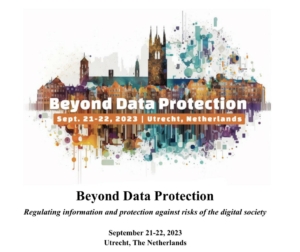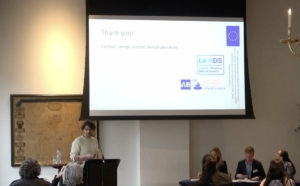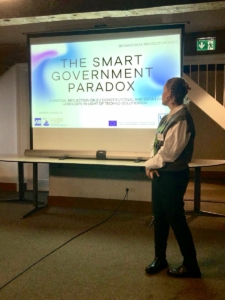ESR Onntje Hinrichs and Barbara Lazarotto at Beyond Data Protection Conference
 On 21-22nd September 2023, the “Beyond Data Protection Conference: Regulating Information and Protection against Risks of the Digital Society” took place in Utrecht, The Netherlands. For 2 days, scholars from all over the world explored the challenges of data-centred legal protection against information-induced harms and considered alternatives beyond data protection. Keynotes were given by the well-known scholars Karen Yeung, Lokke Moerel, and Michael Veale. LeADS ESRs Onntje Hinrichs and Barbara Lazarotto were both present at the conference and presented their latest research.
On 21-22nd September 2023, the “Beyond Data Protection Conference: Regulating Information and Protection against Risks of the Digital Society” took place in Utrecht, The Netherlands. For 2 days, scholars from all over the world explored the challenges of data-centred legal protection against information-induced harms and considered alternatives beyond data protection. Keynotes were given by the well-known scholars Karen Yeung, Lokke Moerel, and Michael Veale. LeADS ESRs Onntje Hinrichs and Barbara Lazarotto were both present at the conference and presented their latest research.
ESR Onntje Hinrichs presented his paper on “Consumer Law as Second  Vantage Point for the Protection of Consumer Data – Protecting or Polluting the Privacy Ecosystem?” in a panel on ‘Beyond Data Protection‘. He elaborated how the regulation of data has increasingly become a regulatory concern for the (market-focussed) European consumer law, despite being anchored in the (fundamental rights-focussed) European data protection framework. Whilst authors have increasingly identified potential complementarities between both fields of law for the protection of consumer data, he argued that they might at times pursue opposite objectives. By drawing parallels with debates that surrounded the uneasy relationship between consumer and environmental policy, Onntje showed how the regulation of consumer data under consumer law potentially not only contributes to the protection but also the pollution of the privacy ecosystem. At the same time, he relied on this analogy to showcase how existing tensions between both policy areas can be overcome.
Vantage Point for the Protection of Consumer Data – Protecting or Polluting the Privacy Ecosystem?” in a panel on ‘Beyond Data Protection‘. He elaborated how the regulation of data has increasingly become a regulatory concern for the (market-focussed) European consumer law, despite being anchored in the (fundamental rights-focussed) European data protection framework. Whilst authors have increasingly identified potential complementarities between both fields of law for the protection of consumer data, he argued that they might at times pursue opposite objectives. By drawing parallels with debates that surrounded the uneasy relationship between consumer and environmental policy, Onntje showed how the regulation of consumer data under consumer law potentially not only contributes to the protection but also the pollution of the privacy ecosystem. At the same time, he relied on this analogy to showcase how existing tensions between both policy areas can be overcome.
 Barbara presented her paper “The Smart Government Paradox: A Critical Reflection on EU Constitutional and Data Law Landscape in Light of Techno-Solutionism” in a panel on Government data and surveillance. She explored how business to government data sharing practices can give governments superpowers which threatens the rights of citizens. She made an analysis of how the creation of multilayered data access rights in the public sector can give citizens tools to fight against smart government abuses.
Barbara presented her paper “The Smart Government Paradox: A Critical Reflection on EU Constitutional and Data Law Landscape in Light of Techno-Solutionism” in a panel on Government data and surveillance. She explored how business to government data sharing practices can give governments superpowers which threatens the rights of citizens. She made an analysis of how the creation of multilayered data access rights in the public sector can give citizens tools to fight against smart government abuses.





